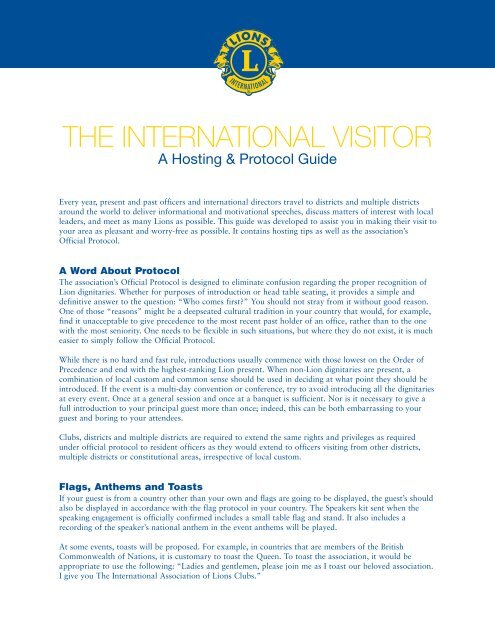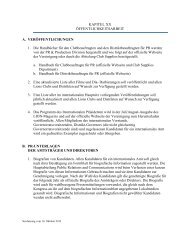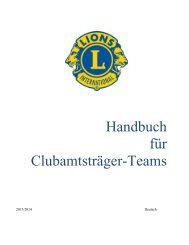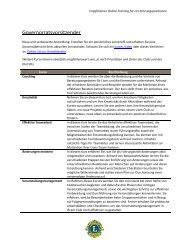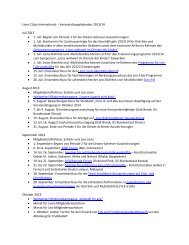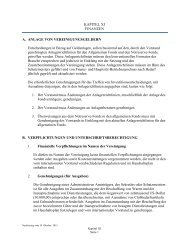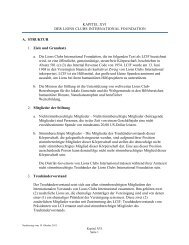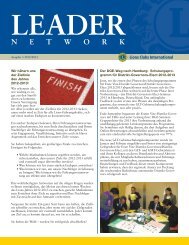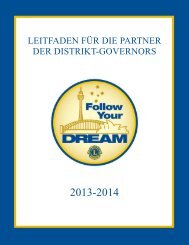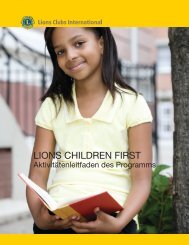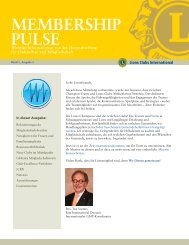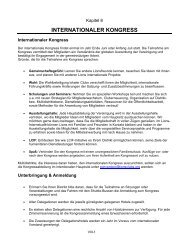A Hosting & Protocol Guide (pr768.pdf) - Lions Clubs International
A Hosting & Protocol Guide (pr768.pdf) - Lions Clubs International
A Hosting & Protocol Guide (pr768.pdf) - Lions Clubs International
You also want an ePaper? Increase the reach of your titles
YUMPU automatically turns print PDFs into web optimized ePapers that Google loves.
THE INTERNATIONAL VISITOR<br />
A <strong>Hosting</strong> & <strong>Protocol</strong> <strong>Guide</strong><br />
Every year, present and past officers and international directors travel to districts and multiple districts<br />
around the world to deliver informational and motivational speeches, discuss matters of interest with local<br />
leaders, and meet as many <strong>Lions</strong> as possible. This guide was developed to assist you in making their visit to<br />
your area as pleasant and worry-free as possible. It contains hosting tips as well as the association’s<br />
Official <strong>Protocol</strong>.<br />
A Word About <strong>Protocol</strong><br />
The association’s Official <strong>Protocol</strong> is designed to eliminate confusion regarding the proper recognition of<br />
Lion dignitaries. Whether for purposes of introduction or head table seating, it provides a simple and<br />
definitive answer to the question: “Who comes first?” You should not stray from it without good reason.<br />
One of those “reasons” might be a deepseated cultural tradition in your country that would, for example,<br />
find it unacceptable to give precedence to the most recent past holder of an office, rather than to the one<br />
with the most seniority. One needs to be flexible in such situations, but where they do not exist, it is much<br />
easier to simply follow the Official <strong>Protocol</strong>.<br />
While there is no hard and fast rule, introductions usually commence with those lowest on the Order of<br />
Precedence and end with the highest-ranking Lion present. When non-Lion dignitaries are present, a<br />
combination of local custom and common sense should be used in deciding at what point they should be<br />
introduced. If the event is a multi-day convention or conference, try to avoid introducing all the dignitaries<br />
at every event. Once at a general session and once at a banquet is sufficient. Nor is it necessary to give a<br />
full introduction to your principal guest more than once; indeed, this can be both embarrassing to your<br />
guest and boring to your attendees.<br />
<strong>Clubs</strong>, districts and multiple districts are required to extend the same rights and privileges as required<br />
under official protocol to resident officers as they would extend to officers visiting from other districts,<br />
multiple districts or constitutional areas, irrespective of local custom.<br />
Flags, Anthems and Toasts<br />
If your guest is from a country other than your own and flags are going to be displayed, the guest’s should<br />
also be displayed in accordance with the flag protocol in your country. The Speakers kit sent when the<br />
speaking engagement is officially confirmed includes a small table flag and stand. It also includes a<br />
recording of the speaker’s national anthem in the event anthems will be played.<br />
At some events, toasts will be proposed. For example, in countries that are members of the British<br />
Commonwealth of Nations, it is customary to toast the Queen. To toast the association, it would be<br />
appropriate to use the following: “Ladies and gentlemen, please join me as I toast our beloved association.<br />
I give you The <strong>International</strong> Association of <strong>Lions</strong> <strong>Clubs</strong>.”
Tips for a Successful Visit<br />
Before the Visit<br />
• Provide advance information including:<br />
-an agenda (make it clear what events your guest is expected to attend)<br />
-suggested attire or dress code (formal, business, etc.) for each event<br />
-weather conditions in your area<br />
-background information (newsletters, bulletins)<br />
• Communicate fully and often<br />
• Keep in mind that local expenses, including special events (tours, golf, etc.), are the host’s responsibility<br />
Meeting and Greeting Your Guest<br />
For Air Travel:<br />
• The chairperson of the meeting or convention (council chairperson, district<br />
governor, etc.) should head the group meeting your guests.<br />
• Plan on meeting your guests at the gate. If this is not possible, plan a meeting place in advance.<br />
• Make sure you are readily identifiable with <strong>Lions</strong> clothing and badges.<br />
• Plan on carrying your guests’ luggage.<br />
• Make sure your car is large enough to accommodate all guests and their luggage. Many times your guests<br />
may have been away from home for awhile and have more luggage than you expect. Having an extra car<br />
available in case of extra luggage is prudent.<br />
For Car Travel:<br />
• If your guests are driving, provide them with complete directions, including a map.<br />
Make the Stay an Enjoyable Experience<br />
• Before your guests’ arrival, handle check-in and inspect the room thoroughly. Deal with any problems<br />
prior to your guests’ arrival.<br />
• Amenities are always a nice touch — the personal preference sheet sent by <strong>International</strong> Headquarters<br />
before your guests’ arrival will give you ideas for these items.<br />
• Prepare a welcome packet with the final agenda for your meeting or convention, information about the<br />
area and some regional publications. Also include a list of room numbers and/or telephone numbers of<br />
key <strong>Lions</strong>.<br />
• Once you bring your guests to their room, plan a time to go over their schedules in detail. Review pickup<br />
times and proper dress for all events.<br />
• Give your guests time to settle in.<br />
• Appoint a full time host and hostess to the couple. This is usually best handled by a past international<br />
director and spouse. This will ensure your guests’ needs are taken care of and that they arrive at events<br />
on time.<br />
• Provide some free time for rest in the schedule.<br />
Program Suggestions<br />
• Your guest’s address should be the centerpiece of the banquet or event. In most cases, this means directly<br />
after dinner and before any entertainment or other presentations.<br />
• Your guest should only be expected to make one major address.<br />
• It is appropriate to present your guest with a gift at the banquet or other major event. Please keep in<br />
mind space and travel considerations. A donation in the guest’s name to LCIF is always welcome. If<br />
possible, offer to mail larger gifts.<br />
• If you expect your guest to assist in giving out awards during the event, make sure a script is prepared,<br />
including background information on recipients.<br />
Departure<br />
• Attend to your guests’ departure with the same care you gave their arrival. Handle check out for your<br />
guests and arrange for luggage pick-up.<br />
• Escort them from their hotel room all the way to the airport gate.<br />
• Check that your guests’ flight is leaving on time. If there is a serious delay, make necessary transportation<br />
and hotel arrangements.<br />
Some Final Notes<br />
• Treat your guests as you would a family member or close friend. Ask yourself: how would I wish to be<br />
treated if I was the guest? Act accordingly.<br />
• While a gift is optional, remember that a sincere thank you note is not.
General Comments–When a Lion holds more than one title, he or she shall be recognized for the highest<br />
one. In areas that have positions in addition to those listed above, they should be recognized in accordance<br />
with local customs, provided that elective officers always have precedence over appointive ones. It is<br />
recommended that Melvin Jones Fellows be recognized as a group. In introducing speakers, their status as<br />
Fellows should be mentioned.<br />
Non-Lion Dignitaries<br />
Non-Lion dignitaries should be given precedence in accordance with local protocol and/or custom, keeping<br />
in mind that if the non-Lion is the principal speaker, then he or she should be seated directly to the right of<br />
the chairperson (see below).<br />
Head Table Seating<br />
The presiding officer or meeting chairperson must always be seated at the most central seat at<br />
the table when there is no central podium, shown as seat number one in the following diagram (Figure 1).<br />
The principal speaker would occupy seat number two, then other Lion dignitaries in accordance with the<br />
general order of precedence. If possible, there should be the same number of seats to the right and left of<br />
the chairperson or presiding officer (who would normally be the club president, district governor, council<br />
chairperson or international president).<br />
(Audience) Figure 1<br />
7 5 3 1 2 4 6<br />
As shown in figure 2, seating at a head table with a podium is essentially the same, except the meeting<br />
chairperson or presiding officer is always seated at the left of the podium (facing the<br />
audience) and the principal speaker at the right.<br />
(Audience) Figure 2<br />
7 5 3 1 Podium<br />
2 4 6 8<br />
When spouses are present, they should be seated to the member’s left when on the left side of the table, on<br />
the member’s right when on the right side of the table.<br />
Master of Ceremonies and Meeting Secretaries<br />
At some events, the Master of Ceremonies (emcee) will be someone other than the chairperson<br />
or presiding officer. In such cases, he or she should be seated in accordance with local customs, or at one end<br />
of the head table. If, however, his or her place in the general order of precedence dictates a specific seat (e.g.,<br />
he or she is a past international president at a district function), then that should rule. On rare occasions,<br />
there will be a meeting secretary; again, local customs should rule.<br />
Multi-Head Tables<br />
If there is more than one head table, the table at the highest level shall be considered the primary one.<br />
Care should be taken not to seat <strong>Lions</strong> of the same rank at different tables.<br />
Head Table Introductions<br />
Introduction of the head table should begin with the meeting chairperson or presiding officer, then<br />
continue from the person with the lowest rank on the order of precedence to the person<br />
with the highest. When spouses are present at the head table, they should be introduced with<br />
the member first (e.g., “Past <strong>International</strong> Director John Doe and his wife Jane”).<br />
National Anthems<br />
When official representatives of the <strong>International</strong> Board of Directors (whether or not currently serving on<br />
the board) from another country are present at an event where national anthems are normally played, they<br />
should be extended the privilege of having their anthem played.
PUBLIC RELATIONS AND COMMUNICATIONS<br />
300 W 22ND ST | OAK BROOK IL 60523-8842 | PHONE 630-203-3812 | FAX 630-571-685<br />
e-mail: publicrelations@lionsclubs.org | www.lionsclubs.org<br />
PR 768 EN 9/12


